The potential economic impact of a China shock on Australia
China is a key downside risk to the outlook.
The Chinese economy is back on the RBA's list of its key concerns, with Governor Lowe recently highlighting that:
"There are significant uncertainties around [Australia's] outlook … [where] globally there is increased uncertainty around the outlook for the Chinese economy due to ongoing stresses in the property market.”
The concern around China revolves around the correction that is under way in the property market, where property overhangs can extend downturns and restrain economic recoveries.
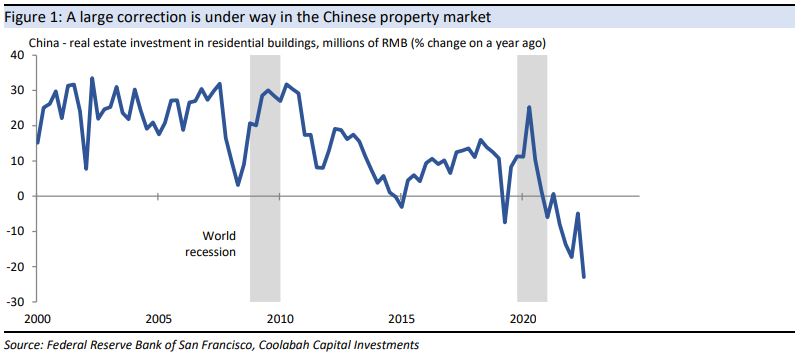
At the same time, there are longstanding structural challenges faced by the Chinese economy, which include:
-
Persistent overinvestment.
Investment as a share of GDP is extremely high compared with China's manufacturing peers, other emerging market economies, and advanced economies; -
Poor demographics.
China's population fell last year for the first time since a steep famine-driven decline in 1961 and is expected to fall further over coming decades based on demographic trends; and -
High debt levels.
China has accumulated a lot of debt in a relatively short space of time, with the ratio of debt to GDP eclipsed by only a handful of advanced economies.
For example, the Davis, Liu and Sheng index of economic policy uncertainty in China remains at an extremely high level.
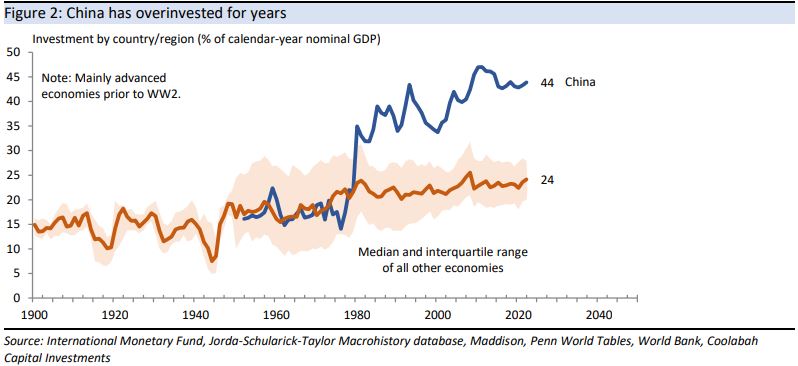
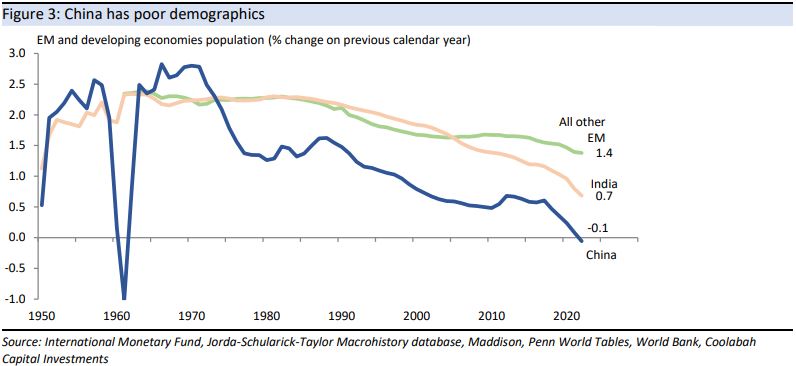
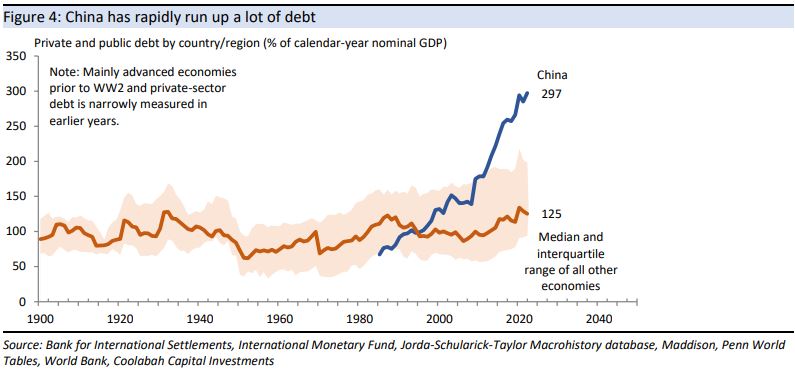
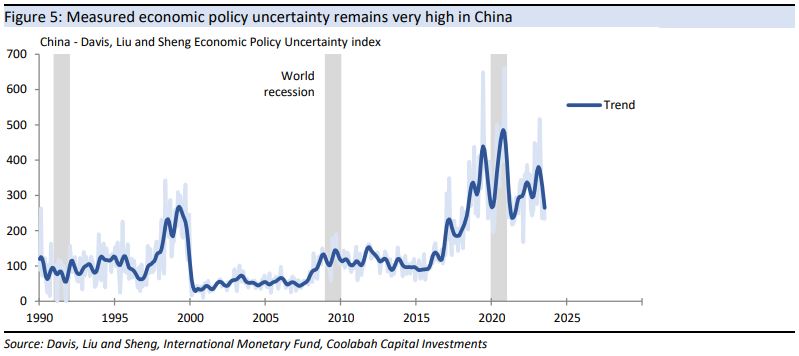
Australia is heavily exposed to China.
China matters for Australia because it remains our largest trading partner, with Australia having the third-highest trade exposure to China among the advanced economies, surpassed only by Korea and Singapore.
Last year, Australian exports to China were worth about 8% of GDP, well above the median share of 2% of GDP for other advanced economies and 1% for emerging market/developing economies.
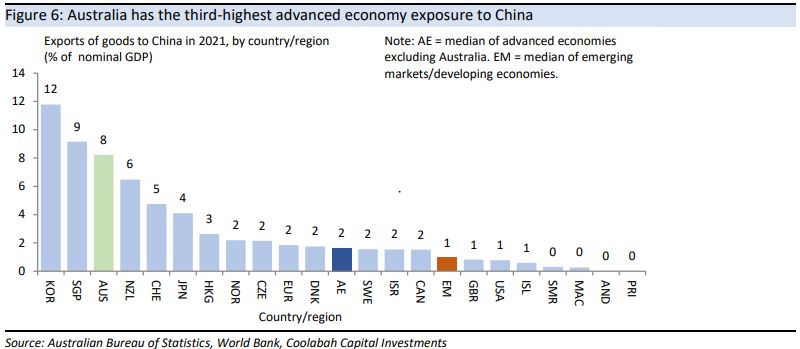
Most of this exposure reflects sales of bulk commodities - exports of iron ore and natural gas are 4% and 1% of GDP, respectively, with coal at zero last year due to a temporary China buying freeze - with the rest made up other commodities and goods, where services are dominated by education.
To place this in perspective, if exports to China were an industry, they would account for about half the size of the mining sector and roughly equal healthcare, which is Australia's second-largest industry.
Exports to China of iron ore alone exceed the output of many industries, including transport, retail, farm, and hospitality.
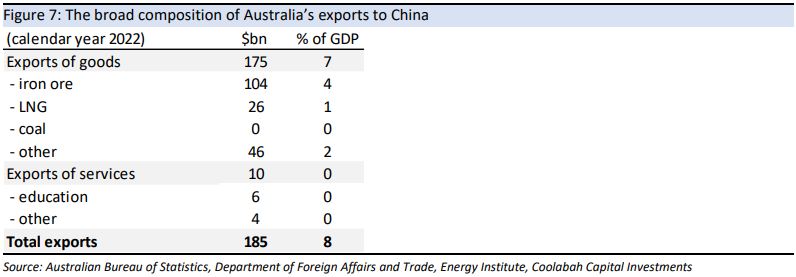
CCI's analysis suggests that income would bear the brunt of a China shock, with a sharply lower AUD an important shock absorber.
Given the downside risk posed by the Chinese economy, we have undertaken a scenario analysis to explore the potential impact of a China shock to Australia's economy.
We did this by estimating a set of simple models, comparing our findings with those from an RBA staff analysis on Spillovers to Australia from the Chinese economy that was published in 2019.
In their work, the RBA economists - Guttman, Hickie, Rickards and Roberts - used the bank's MARTIN macroeconomic model to examine the impact of a 5% decline in Chinese GDP on Australia.
The RBA constructed a few scenarios, the most realistic of which included additional assumptions to deal with effects not captured by the MARTIN model and allowed the exchange rate and cash rate to vary.
The RBA analysis concluded that:
“Trade linkages and … global commodity markets are likely to be the key channels through which a slowing in growth in China would spill over to Australia. ... However, these negative effects can be offset to a degree by an exchange rate depreciation and accommodative monetary policy.”
CCI's approach was different and involved estimating a set of VAR models that included:
- China's real GDP;
- World commodity prices proxied by the RBA non-rural commodity price index; and
- Australian economic and financial indicators, comprising:
- real exchange rate;
- real GDP;
- unemployment rate;
- real cash rate using the RBA summary measure of expected inflation; and
- underlying inflation.
Like the RBA we explored the potential impact of a 5% decline in Chinese GDP, where 5% is an arbitrary number for a shock, but would be large enough to see the Chinese economy contract modestly.
The analysis showed that a 5% decline in Chinese demand would represent a substantial shock to national income, with a sharply lower exchange rate serving as the main buffer against the shock, supplemented by one or two rate cuts by the RBA.
- Commodity prices slump by close to 30%;
- The real exchange rate drops a sharp 7%;
- National income, as measured by nominal GDP, is down about 5%;
- Real GDP falls by about 2%;
- The unemployment rate increases by 0.6pp;
- Underlying inflation is about 0.3pp lower; and
- The RBA cuts the cash rate by about 0.25-0.5pp.
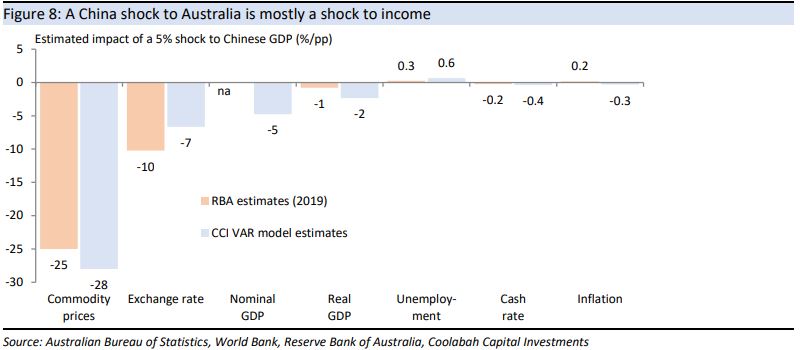
The results echo the RBA's earlier work, with commodity linkages the main way the shock is transmitted to Australia and with a sharply lower exchange rate acting as the main shock absorber, helped at the margin by lower interest rates.
That said, the estimated hit to the Australian economy is generally larger, with a bigger decline in both commodity prices and real output, such that the unemployment rate ends up slightly higher.
The exchange rate falls sharply, but by less than the RBA had estimated, such that the RBA itself takes up the slack, cutting rates by once or twice rather than once as calculated in the RBA analysis.
The only real difference is inflation, where the RBA estimates a slight increase, contrasting with the slight slowdown shown in our work.
In terms of who bears the brunt of lower national income, lower commodity prices would be underpin a similar decline in mining profits, where the mining industry is mainly owned by overseas investors. In turn, lower mining profits would be a major drag on government revenue.
The large estimated impact on commodity prices and the comparatively modest impact on real GDP may seem surprising, but history shows that commodity prices are significantly more volatile than commodity export volumes, as is the case with iron ore sold to China.
Moreover, even when commodity volumes are affected by changed demand from one country - as was the case when China temporarily stopped buying coal from Australia - there is a degree of substitutability in that some exports can be diverted to other countries.
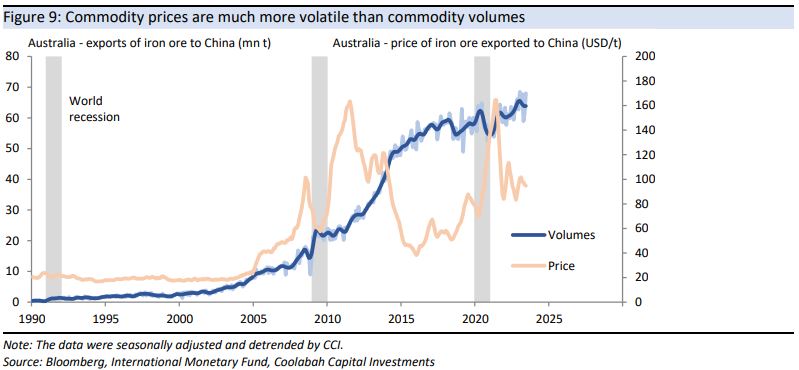
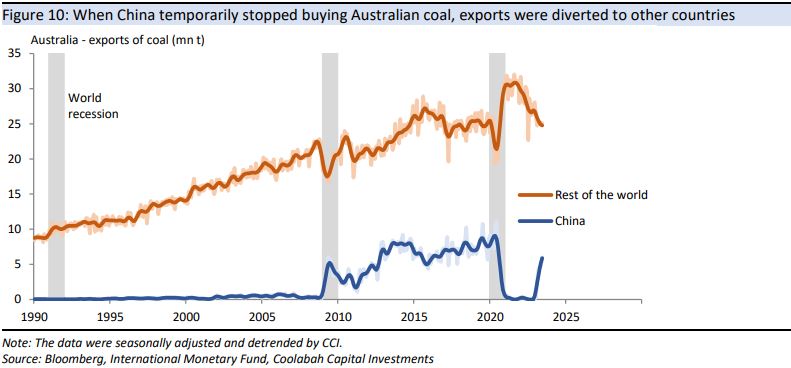
5 topics

